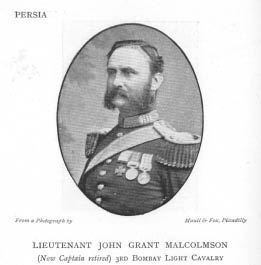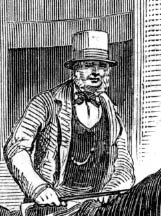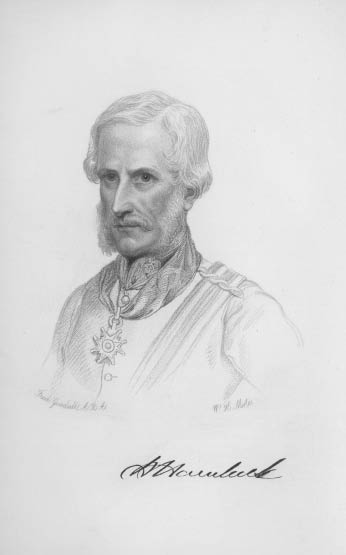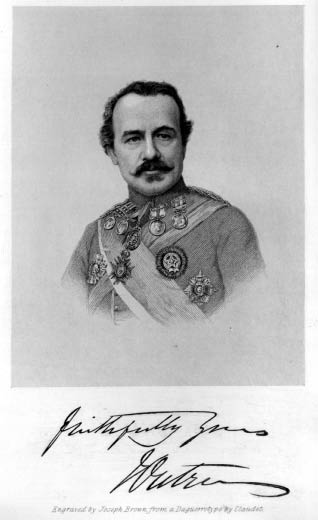
Captain Wood, John Augustus, VC (20th Bombay Native Infantry)
Awarded Victoria Cross
Born 10 June 1818 Fort William Scotland
Joined the 20th Bombay Native Infantry (now the 120th Rajputana Infantry) in 1839; served in the Persian Expedition of 1856-57, and was awarded the Victoria Cross [London Gazette, 3rd Aug. 1860]: “ John Augustus Wood, Capt., 20th Bombay Native Infantry.
Date of Act of Bravery: 9 Dec. 1856. On the 9th Dec. 1856, Capt. Wood led the Grenadier Company which formed the head of the assaulting column sent against Reshire. He was the first man on the parapet of the fort, where he was instantly attacked by a large number of the garrison, who suddenly sprang on him from a trench cut in the parapet itself. These men fired a volley at Capt. Wood and the head of the storming party, when only a yard or two distant from that officer but although Capt. Wood was struck by no less than seven musket-balls, he at once threw himself upon the enemy, passed his sword through the body of their leader, and being closely followed by the men of his company, speedily overcame all opposition, and established himself in the place. Capt. Wood’s decision, energy and determined valor undoubtedly contributed in a high degree to the success of the attack. His wounds compelled him to leave the force for a time; but with the true spirit of a good soldier he rejoined his regiment, and returned to his duty at Bushire before the wounds were properly healed.”
Died 23 January 1878 at Poona India from a concussion of brain, aged 59.

Major General A. T. Moore (3rd Bombay Light Cavalry)
Awarded Victoria Cross
Son of Mr. E.F. Moore, formerly of the 45th Regiment, and belonged to an old family in county Louth. General Moore was born 20 September 1830, and when 20 years of age joined the 3rd Bombay Light Cavalry. With this regiment, of which he was adjutant, he saw much service. He fought through the Persian Campaign on 1856-7. The act of valour for which he received the Victoria Cross was performed at the battle of Khoosh-ab. He charged an infantry square of 500 Persians at the head of his regiment and jumped his horse over the bayonets of the enemy. He stood with shattered sabre astride his dead charger, until Lieutenant J.G. Malcolmson came to his assistance and bore him safely away. Captain Malcolmson, who died a few years ago, also received the Victoria Cross. General Moore afterwards took part in the Indian Mutiny under Sir Hugh Rose. He took part in the siege and capture of Raghur, the action at Barodia, the relief of Saugor, the siege and capture of Garakota, the forcing of the Mudenpore Pass, the affairs on the Jumna, the capture of Calpee, the advance on and capture of Gwalior, the action at Morar, the battle of Jowra Alipore, and the action of Mhow-Mohoni. He was mentioned in despatches and received the medal with clasp. He was made a C.B. in 1887 and retired from the service in the following year.
Died 25 April 1925 in Dublin from heart failure at the age of 93.

Lieutenant Malcolmson, John Grant, VC (3rd Bombay Light Cavalry)
Awarded Victoria Cross
Born 9 February 1835, the son of the late James Malcolmson, of Muchrach, Inverness-Shire. He entered the 3rd Bombay Light Cavalry, served in the Persian War, and was present at the capture of Reshire and surrender of Bushire in the Persian War (V.C., Medal with clasp). He served in the Indian Mutiny Campaign, and was present at the Central India operations from the siege of Ratghur to the fall of Calpe. he served in the Persian Expedition of 1857, and was awarded the Victoria Cross (London gazette, 3 Aug. 1860):” Arthur Thomas Moore, Lieut. and Adjutant, and John Grant Malcolmson, Lieut. 3rd Bombay Native Cavalry.
Date of Acts of Bravery: 8 Feb. 1857. On the occasion of an attack on the enemy on the 8th Feb. 1857, led by Lieut. Colonel Forbes, C.B., Lieut. Moore, the Adjutant of the regiment, was perhaps the first of all by a horse’s length. His horse leaped into the square and instantly fell dead, crushing down his rider and breaking his sword as he fell amid, the broken ranks of the enemy. Lieut.. Moore speedily extricated himself, and attempted with his broken sword to fore his way through the press; but would assuredly have lost his life had not the gallant young Lieut. Malcolmson, observing his peril, fought his way to his dismounted comrade through a crowd of enemies, to his rescue, and giving him his stirrup, safely carried him through everything out of the throng. The thoughtfulness for others, cool determination and ready activity shown in extreme danger by this young officer, Lieut. Malcolmson, appear to have been most admirable, and to be worthy of the highest honor.” Lieut. Malcolmson became a Gentleman - at - Arms in 1870. Died suddenly 14 August 1902 in London, aged 67.

Commodore Ethersey, Richard, I.N.
After the capture of Bushire, immediately prior to the attack upon Mohamra, on the 17th of March, 1856, committed suicide while suffering under mental aberration.
The sad state of nervous depression to which Commodore Ethersey had been reduced was fully stated before the Court of Inquest. “ If there was one officer more than another who commanded the respect and confidence of the entire service, as in every way calculated for a high command by reason of his antecedents, great experience, and indomitable courage and resolution, it was Richard Ethersey, ‘Grim Dick’ as he was called; but failing health had unstrung his nerve, and he who some ten years before would have rejoiced at the opportunity of earning distinction at the cannon’s mouth, shrunk from responsibility and was full of chimerical fears.”

Major-General Havelock, Sir Henry, KCB
Henry Havelock was born on 5 April 1795 at Ford Hall, Bishopwearmouth (now in Sunderland), the son of William Havelock, a wealthy shipbuilder, and Jane, daughter of John Carter, solicitor, of Stockton-on-Tees. He was the second of four brothers, all of whom entered the army.
He is particularly associated with India. He was noted for his recapture of Cawnpore from rebels during Indian Rebellion of 1857. In that year, he was selected by Sir James Outram to command a division in the Anglo-Persian War, during which he was present at the action of Muhamra against the forces of Nasser al-Din Shah under command of Khanlar Mirza. Peace with Persia freed his troops just as the Indian Mutiny broke out; and he was chosen to command a column to quell disturbances in Allahabad, to support Sir Henry Lawrence at Lucknow and Wheeler at Cawnpore, and to pursue and utterly destroy all mutineers and insurgents. Throughout August Havelock led his soldiers northwards across Oudh (present day Uttar Pradesh), defeating all rebel forces in his path, despite being greatly outnumbered. His years of study of the theories of war and his experiences in earlier campaigns were put to good use. At this time Lady Canning wrote of him in her diary: “General Havelock is not in fashion, but all the same we believe that he will do well.” But in spite of this lukewarm commendation Havelock proved himself the man for the occasion and won a reputation as a great military leader.
Three times he advanced for the relief of the Lucknow, but twice held back rather than risk fighting with troops wasted by battle and disease. Reinforcements arrived at last under Outram, and he was able to capture Lucknow on the 25th of September 1857. However, a second rebel force arrived and besieged the town again. This time Havelock and his troops were caught inside the blockade.
There he died on the 29 November 1857 of dysentery, a few days after the siege was lifted.

Brigadier-General Jacob, John, CB
Born on 11 January 1812 at Woolavington, in the county of Somerset, England.
Officer of the British East India Company who served in colonial India for the major portion of his career. He is known for the cavalry regiment called 36th Jacob’s Horse and for founding the town of Jacobabad. He was commissioned into the Bombay Artillery (Bombay Army) on his 16th birthday, and subsequently sailed for India in January 1828, never to set foot in England again.At the outbreak of the Anglo-Persian War, Jacob was put in charges of the cavalry and departed for Persia. He was raised to the rank of Brigadier-General, and appointed A.D.C. to Queen Victoria. When he arrived at Bushire, General Stalker having suddenly died, Jacob was put in charge of 3000 men. Peace favourable to the British Government having been negotiated, Jacob was left in charge of conducting the evacuation of Bushire.
A month after the end of hostilities with the Persians, the Indian rebellion of 1857 had broken out, Jacob’s Horse remained loyal throughout. He was anxious to return to India, as he had been selected for the command of the Central Indian Army. Delayed in Bushire by the insistence of the British minister there, Lord Elphinstone was unable to await his arrival. The command was given to Sir Hugh Rose instead. Jacob returned to Jacobabad where he raised two regiments of infantry.
He died of ill health at Jacobabad on 6 December 1858.
He was buried in the town where his grave has been well maintained by the locals for whom he retains a cult status.

General Outram, Sir James, 1st Baronet GCB KSI
Born on 29 January 1803.
Appointed in 1857, with the rank of lieutenant-general, to command an expedition against Persia. He defeated the enemy with great slaughter at Khushab, and conducted the campaign with such rapid decision that peace was shortly afterwards concluded, his services being rewarded by the grand cross of the Bath.
From Persia he was summoned in June to India, with the brief explanation “We want all our best men here”. It was said of him at this time that a fox is a fool and a lion a coward by the side of Sir J. Outram. Immediately on his arrival in Calcutta he was appointed to command the two divisions of the Bengal army occupying the country from Calcutta to Cawnpore; and to the military control was also joined the commissionership of Oudh. Already the mutiny had assumed such proportions as to compel Henry Havelock to fall back on Cawnpore, which he only held with difficulty, although a speedy advance was necessary to save the garrison at Lucknow. On arriving at Cawnpore with reinforcements, Outram, in admiration of the brilliant deeds of General Havelock, conceded to him the glory of relieving Lucknow, and, waiving his rank, tendered his services to him as a volunteer. During the advance he commanded a troop of volunteer cavalry, and performed exploits of great brilliancy at Mangalwar, and in the attack at the Alambagh; and in the final conflict he led the way, charging through a very tempest of fire. The volunteer cavalry unanimously voted him the Victoria Cross, but he refused the choice on the grounds that he was ineligible as the general under whom they served.
Resuming supreme command, he then held the town till the arrival of Sir Colin Campbell, after which he conducted the evacuation of the residency so as completely to deceive the enemy. In the second capture of Lucknow, on the commander-in-chief’s return, Outram was entrusted with the attack on the side of the Gumti, and afterwards, having recrossed the river, he advanced through the Chattar Manzil to take the residency, thus, in the words of Colin Campbell, putting the finishing stroke on the enemy. After the capture of Lucknow he was gazetted lieutenant-general. He died on the 11 March 1863[1], and was buried in Westminster Abbey, where the marble slab on his grave bears the poignant epitaph The Bayard of India.

Commander Selby, W. B., I.N.
W.E. Selby was one of the most influential figures of the Persian War in view of his already formidable reputation as a Marine Surveyor.
After many notable expeditions and having commissioned Palinurus as a survey ship in 1853, he was place to command Ajdaha (q.v.) in 1854 and then Comet in 1855.
At the start of the Persian campaign, Comet was stationed on the Tigris between Bussorah and Baghdad, and was later engaged at Mohamra (q.v.) towing Commander Rennie’s ingenious and justly-famous mortar raft.
Later in the same assault, Selby commanded Semiramis and took her into action along with the sloop Clive (q.v.) which she towed. He then took the Comet into action against Ahwaz (q.v.) and for all his efforts, Selby received the Thanks of the Indian Government at the conclusion of the War. Earlier , after the capture of Mohamra, Commodore Young had written:
“The important services rendered by Commander Selby, to whose local knowledge I am much indebted, elicited my warmest admiration by the dashing manner in which he carried the Semiramis into the channel leading to Mohamra, between the forts on either bank.”
Selby served as Surveyor-General, Mesopotamia, until his retirement in 1862 and died in England on May 24, 1876.

General Stalker, Foster
Born on 20 Feb 1798, son of Joshua Stalker, a ship broker, and his wife Esther. Baptised on 24 Apr 1798 at Maryport Chapel in the parish of Cross Canonby, Cumberland
Educated at the Green Row school, Abbey Holme, Cumberland, receiving a mathematical education.
Entered Bombay army 1818; Lieut. 10 Bombay N.I. 11 April 1819; lieut. Col. 19 Bombay native infantry 15 May 1850; colonel 2 Bombay European regt. 15 May 1850 to death; commanded Rajpootana field force 22 Dec. 1849 to 27 April 1853; commanded northern division 27 April 1853 to death, one of the divisions under Sir James Outram, which was sent from Bombay against Persia and landed at Bushire in the Persian gulf 27 Jany. 1857; M.G. 28 Nov. 1854; C.B. 20 Dec. 1839; shot himself at Bushire 14 March 1857
Appointed to the Command of the Expeditionary Field Force in the Persian Gulf in Oct 1856, commanding the capture of Bushire on 10 Dec 1856
‘We have felt it a pleasing duty to draw the attention of the Right Honorable the Governor General of Indian Council to the gallantry, in carrying out these important operations by Major General Stalker, Rear Admiral Sir Henry Leeke, and by the officers and men under their command and we now feel the highest pleasure in bringing the services rendered on this occasion prominently to the notice of your Honourable Committee’ (Despatches from the Government of Bombay to the Secret Committee published in the London Gazette 30 Jan 1857)